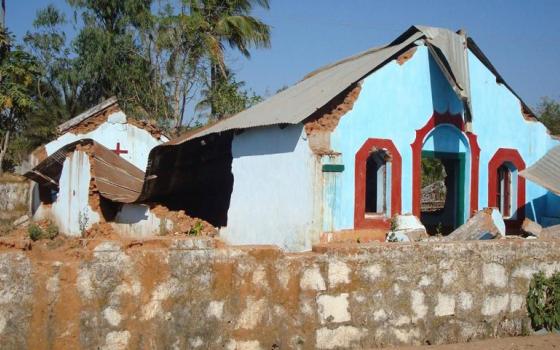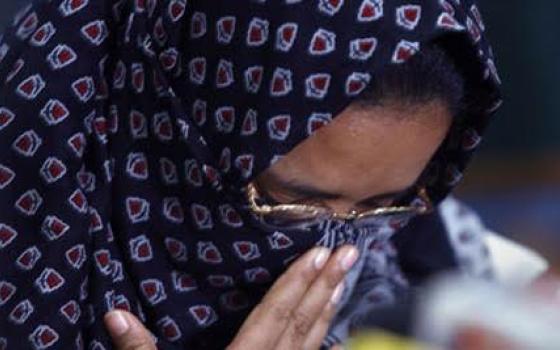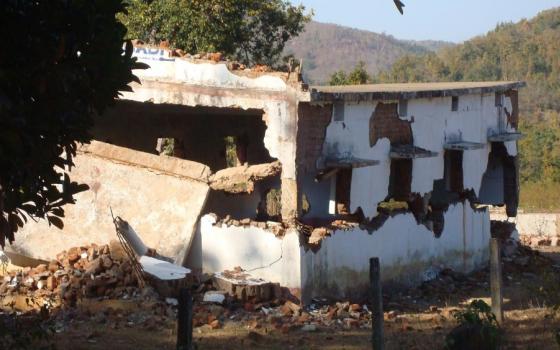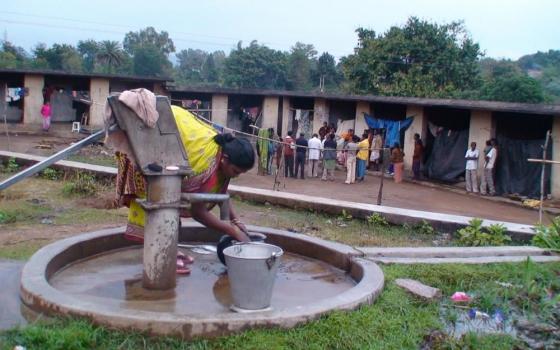Sr. Meena Barwa has forgiven the men who attacked her nearly eight years ago. The gang rape was a horrifying experience, but the aftermath was more painful, she says.
Barwa, 34, is a member of the Handmaids of Mary, an indigenous congregation of Odisha, an eastern Indian state.
She was among the victims of the worst anti-Christian violence in India's modern history. The violence began Aug. 24, 2008, a day before Barwa was raped, and lasted four more months. The mayhem claimed more than 90 lives and reduced 395 churches and other places of worship to ashes. Nearly 56,000 people ended up displaced and destitute.
Barwa was a social worker at Divya Jyoti ("Divine Light") Pastoral Centre, one of the torched church institutions, in Odisha's Kandhamal district. She had taken her final vows in the congregation only a few months before.
She says she has overcome her trauma with prayer and counseling that has inspired her to fight her case in court in a country where most rape victims go into hiding because of the shame. The latest National Crime Records Bureau statistics say 93 women are raped every day in India.
She now is studying law to help women and children in distress. In the last two years, she has worked in a school office, which she says has given some stability to her life.
She recently shared with Global Sisters Report her life since the violence.
GSR: Nearly eight years have passed since that terrible incident. How have you managed all these years?
Barwa: I live a normal life today because of God's mercy, acceptance and love. I met many people who came as angels to support and encourage me. I have overcome about 90 percent of my trauma.
What did you do during these years?
I suffered insecurity and uncertainty. I had to be on the move always for my safety and protection. I went to several places, from Delhi to Kanniyakumari in Tamil Nadu state [the country's southernmost tip]. It was an experience of living in exile.
My biggest challenge was to hide my identity. I underwent treatment for my physical, emotional, psychological and spiritual well-being. I had nightmares almost every night. I used to wake up suddenly in fear at least two times a night.
I also had to go to jail for the TIP [Test Identification Parade] to identify those who violated me and to court for the trial of the case.
What is the status of your court case?
My case has two parts. The first part was the trial of five people the police managed to arrest. The second part involves four others who have not been brought to justice.
The first part is over and the court has given the verdict. One of the convicted was given 10 years of hard labor in jail while two received three years of rigorous imprisonment. The court freed two others for lack of evidence.
The second part of the case will begin only after the police manage to arrest the four fugitives. What worries me is that four of the accused are still at large.
What has been your experience in the court?
During the trial period, I could not sleep for days because I was forced to relive my horrible experience. Many questions from the defense lawyer were not related to the case. I got the feeling that the court was a place to humiliate, offend, accuse falsely, frighten or torture a victim. Everyone knows what really had happened. Why did the defense lawyer ask me some 400 questions over a period of six days? I am not criticizing the legal system or the court proceeding. I am only sharing my experience.
It is reported that one rape takes place every 30 minutes in India. How do you identify with the victims?
It is shocking to hear such statistics. Whenever I hear about a woman's rape, I feel a part of me is continuing to suffer. Women are considered weak and subhuman in India. Rape is the most heinous offense because our society stigmatizes its victims.
Whenever I hear about a woman being attacked or raped, my heart breaks again. In many cases, the woman is killed or she commits suicide. They suffer unspoken humiliation and shame and live traumatized — mentally, physically and psychologically. Many want to end their lives after the atrocity. Many lose their mental balance. They are not accepted by family and society. In other words, their lives are totally devastated. Such a scenario does not let me be at peace. They only become my strength and add to my hunger for justice.
Many rape victims prefer not to go to court because of the reasons you have just listed. Why did you decide to go ahead with the case?
I went ahead with the case because I had to do it. If I had not done that, I would have failed my people who also suffered with me. They continue to suffer pain, anxiety, fear. They lost identity, culture, education, livelihood, jobs, properties and ancestral holy lands. Our people too experience uncertainty and insecurity. Their shattered lives added to my pain and anguish.
I decided to not let my crosses put me down, but use them as my source of strength. Many survivors of the Kandhamal violence have gone away to different cities for their livelihood and safety. They are afraid to reveal their identity. A good number have settled in slums in cities. The once peaceful and serene Kandhamal has become a land of challenges and struggles.
What gives you courage?
The belief that Jesus my master is there for me. His consoling words — 'I will give you words and wisdom that none of your opponents will be able to resist or contradict' (Luke 21:15) — ring in my ears. Actually, I got this message during the court trial as I used to divert my mind by reading a booklet, 'Lord of Hosts,' where I found these consoling words. I am convinced that I am fighting for a cause — justice and peace for the poor and downtrodden.
The mob that attacked me and Fr. Thomas Chellan and paraded us on the street threatened to kill us several times. But the experience helped me value human life. Since the incident, I was forced to live away from my congregation and community. I do not follow all religious rituals, and I dress as a laywoman. However, I have lived my life to the fullest as human, Christian and as religious. It is true I experienced humiliation, shame, fear and threat to life. But I also experienced God's abundant richness, honor, courage, strength and protection.
I also realized there was no point in getting dejected and depressed because of that horrible incident. Instead, I took up studies to overcome my trauma. I have completed my BA degree with first class [marks of 60 percent or better] and a master of arts with second class [50 percent and above]. I mention my studies because it is a miracle that I could complete them.
Was there any pressure to withdraw the case?
No. There has been none so far.
How did your congregation react to the incident? Were your superiors and others supportive?
Yes, they were very supportive. They went out of their way to help me recover from my trauma. Dealing with a rape victim was something new for the congregation. When I was battling life and death, surrounded by dangers, my then Assistant General Sr. Teresa Dung Dung (who was also my novice director) and my then provincial Sr. Mary, CJ, risked their lives to reach out to me. The sisters kept telling me that they were proud of me. My former provincial, Sr. M. Auxilia, wrote to me that we are part of the suffering people. She helped me realize that Jesus experienced in my body what he could not in his body. As a man he could not share the pain of a rape victim.
Soon after the incident, you addressed a press conference in Delhi with your face covered by a shawl. Why did you opt for such public exposure? How did it help?
I did go for a press conference on Oct. 24, 2008, in New Delhi because some people tried to malign me. Some groups did not want that truth spoken out. And I wanted to tell the unspoken pain of every rape victim and the suffering of Kandhamal survivors. Even the police kept quiet for 40 days after I filed the First Information Report.
How did the media treat your case? Was it supportive?
I read in some newspapers that my story was false. But there was pin-drop silence as I spoke at the press conference. I saw some shedding of tears.
Were you attacked because you come from a tribal community and belong to a minority group?
I was attacked because I am a member of a minority group. The fundamentalists attacked me because they wanted to destroy and wipe out Christianity, offend and inflict pain on me and on the church.
What prompted you to become a Catholic religious? How do you find religious life?
I studied in a school managed by the Handmaids of Mary sisters. I was drawn toward their way of life by seeing their prayers, simplicity and dedicated service. My father's cousin, Sr. Josepha, played a great role in my becoming a religious. She is my spiritual mother.
Please tell us something about your family and childhood.
I was born in 1979 at Rengali in Odisha's Sundargarh district. I am the second of five children. My family was displaced when I was 4 because of a hydroelectrical project meant for a steel plant.
With the compensation, my father bought a small plot of land in Sambalpur district, about 120 miles away. We were the only Christians in the Hindu-dominated new place. Initially, people looked at us with suspicion. It took years to adjust and live together. My parents had to face financial, cultural, social and educational struggles to survive. Our parish church was 20 kilometers away, and we had to walk to the church through forests with wild animals and across rivers.
My father wanted us children educated in good schools, so he put us in church-run schools in Sundargarh district. I graduated the 10th grade in 1995 and joined the Handmaids of Mary congregation. I took first vows in 2000 and final vows in 2008. I studied a two-year diploma course in theology and took care of our congregation's candidates for some time. My apostolate was socio-pastoral. What I enjoyed the most was visiting families, working with them and for them.
Any final reflection?
The painful incident has taught me to face challenges, to become courageous. It has helped me to trust God completely and understand his plans for me. God has kept me alive to see his glory and be grateful to him. It has also made me optimistic.
For me, the greatest gift from God is my vocation as a religious nun. Religious life is full of challenges and blessings. Whatever the challenge, we need to have a positive outlook toward everything. I have forgiven those who violated my body and those who indulged in murder, looting and arson. This has liberated me. I like to quote St. Paul: 'I consider that our present sufferings are not worth comparing with the glory that will be revealed in us' (Romans 8:18).
[Santosh Kumar Digal is a freelance journalist who has worked in major English language newspapers such as Orissa Post and Sambad Plus in Bhubaneswar, capital of Odisha state in eastern India. He also writes for several national and international news agencies and portals, and teaches journalism in universities in Odisha.]



